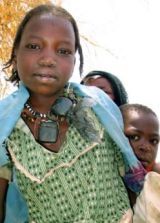Refugees caught in the crossfire between Chad and Sudan
April 16, 2006 (N’DJAMENA) — Humanitarian groups on Sunday said the fate of 200,000 refugees was hanging in the balance because of the escalating crisis between Chad and Sudan but they doubted Chadian President Idriss Deby Itno would expel them from his country.
 Deby threatened to close camps housing refugees from Sudan’s conflict-ridden Darfur region after rebels he says are backed by the neighbouring regime attacked the Chadian capital N’Djamena on Thursday.
Deby threatened to close camps housing refugees from Sudan’s conflict-ridden Darfur region after rebels he says are backed by the neighbouring regime attacked the Chadian capital N’Djamena on Thursday.
A representative for the UN High Commissioner for Refugees said she was “very worried” about the plight of the refugees who have been living in eastern Chad for three years.
“The refugees have already suffered enough in Darfur. We do not want them to become victims of the tension between the two countries,” Ana Liria-Franch told AFP, adding that rebels have begun entering the camps to recruit fighters.
The non-governmental organisation Care, which is active in four of the 12 camps in eastern Chad, said it believed Deby was playing a political game and it was unlikely he would carry out his threat.
“It does not seem realistic to relocate 200,000 refugees. Where would they go?” said Nicolas Palanque from Care.
He pointed out that Chad has for months been calling for a UN force to be deployed along its troubled border with Sudan and said Deby was now trying to force the hand of the international community.
“But it is not impossible that the government could decide to close the camps from one day to the next and the humanitarian fallout will be very serious,” he warned.
Aid workers said the situation on the Chad-Sudan border has become increasingly dangerous since December as rebels infiltrate the camps which Chadian soldiers are supposed to guard.
“We started having serious problems in December,” a representative from Care told AFP, adding that rebels have stolen about 20 vehicles from humanitarian organisations.
“The rebels use them to make their way across to Sudan,” she explained.
The HRC’s Liria-Franch said the rebels have been coming into the camps to recruit refugees as fighters, often under duress.
She said in February, 24 young men were recruited from the camp at Kounoungo, and in March several hundred, including boys of 14, from the camps in Breidjing and Treguine joined the rebellion.
The HRC has asked Chad to launch an investigation.
Liria-Franch said humanitarian groups were also finding it harder to work with the local authorities as some of them have begun supporting the rebels.
The Sudanese government has denied Chad’s charges that it is supporting and arming rebels from the United Front for Change (FUC).
But Deby has broken off diplomatic relations with Khartoum in retaliation for last week’s uprising and in a stinging attack on Saturday called Sudan’s President Omar al-Beshir a “traitor”.
The attack on N’Djamena came just weeks before Deby is seeking reelection in May 3 presidential elections and observers say the rebellion could break his increasingly weak hold on power.
They also warn that a forced exit for a leader of nearly 16 years could plunge the country into chaos that would ripple across a region already riven by conflict.
Some 300,000 people have died in the ethnic war in Darfur.
UN Secretary General Kofi Annan’s special representative to Sudan Jan Pronk on Saturday warned Deby that expelling the Darfur refugees would be illegal and would create a major humanitarian crisis in an already unstable region.
“Forcing refugees, who are the victims of previous conflicts, to flee again in the course of the current conflict, which is not of their making, would result in great additional suffering for them. It would also violate international humanitarian law,” he said.
(ST/AFP)
